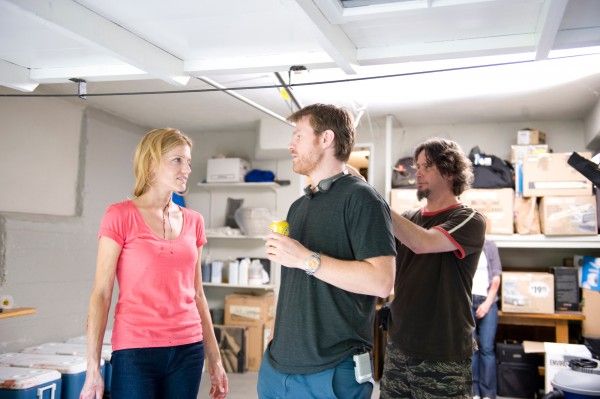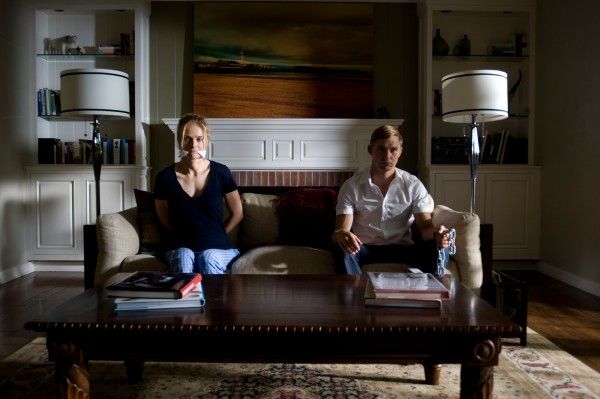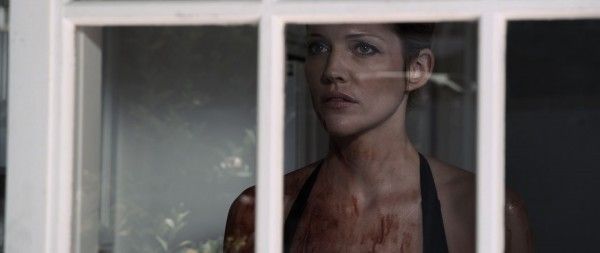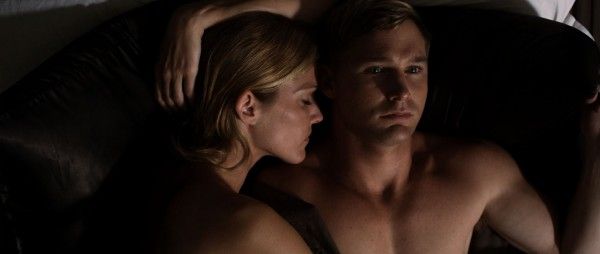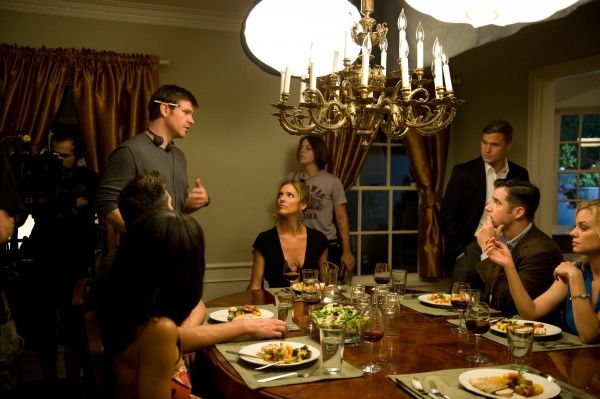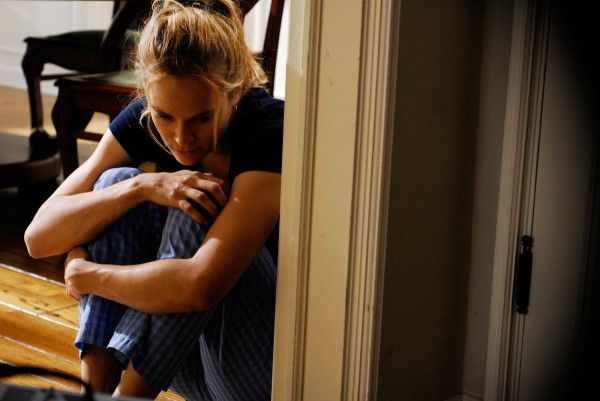Andrew Paquin put his directorial debut Open House on the market at Tribeca and spilled the shoot's bloody details to Collider, along with two of his stars, Rachel Blanchard (Snakes On A Plane) and Brian Geraghty (fresh off The Hurt Locker's Oscar wins). As the title indicates, Alice (Blanchard) opens her home to prospective buyers. A cold-blooded killer (Geraghty) slips in and hides out until he can take her hostage and slay some houseguests with the help of his sociopathic partner, Lila (Battlestar Galactica's Tricia Helfer). True Blood's Golden Globe winner Anna Paquin (yes, she's Andrew's sister) and her real-life fiancée/series co-star Stephen Moyer make extended cameos.
Hit the jump for the full interviews to hear why Paquin's house suffered for his art, what it's like to direct your future brother-in-law in a sex scene that did not involve the bride-to-be, how Blanchard bonded with Geraghty before she was bound by him, and what Ben Stiller told Geraghty about the Oscar-winning ride of The Hurt Locker.
Below is the transcript of our conversation with Andrew Paquin. Here's the audio.
Collider: Welcome Back (to Tribeca).
Andrew Paquin: Yeah, this (is the) 1st time as a director, 2nd time with a film. I had a film called Blue State here (in 2007), which I produced & a friend of mine, Marshall Lewy wrote and directed.
C: What's it like to be back, as a director this time?
AP: Well, it's a very different experience as a director. I mean it's exciting to be here just with a film at all and a great, you know, great privilege to be here at such a quality festival, but as a director, I think it's, it's a more personal experience, because you know, more of, your kind of artistic and creative effort is kind of like, on display. So it's, I think the stakes kind of feel raised.
C: What's more terrifying: the plot of the film or shooting in your own house?
AP: (Laughs) I would say shooting in my own house. That's a good question. Yeah, we kind of trashed my house. But it all got fixed up. It looks, it looks fine now. But the film, you know, (it is) a horror film, or like a suspense film. But, it kind of changes throughout the course of the film and really becomes just as much a character portrait as a scary movie. And at its core, there are two sets of relationships, but the relationship between David (Geraghty) & Lila (Helfer) who are the two kind of monsters of the story is a very dysfunctional one and I think that even though they do terrible things, some people might see things that they might recognize in their own experiences of like, relationships that have reached a tough point or relationships that are failing or slowly dying.
C: What were your favorite horror films growing up?
AP: You know, to be honest, I always found horror films (to be) really terrifying. (Laughs) And so, I, I found them hard to watch growing up. I really did. I think I was, I think I was too affected by them. You know, to this day, one of the scariest movies I've ever seen is, is probably Jaws. And I would, I'm not sure that that is technically a horror film, but it's certainly a terrifying movie. And I think that in terms of like, understanding & trying to figure out how fear is, is created by moving images and story, that's as good an example as any, to look to. You never really see the shark until the end & I think that's one of the things that makes it so effective. And, with Open House, we very purposely didn't do that. We kind of start not knowing much about these people, but the layers are peeled off them. That idea of, like, de-masking these monsters is kind of the point of the film.
C: And you've got a great cast: Tricia Helfer, Brian Geraghty, your sister Anna Paquin & also Stephen Moyer, your future brother-in-law.
AP: (Laughs) Yeah.
C: What were you most concerned with, as a 1st time director working with a great cast like that?
AP: I think the thing that, I think you realize pretty quickly when you're working with good actors is that they listen. And so what you say has a lot of power and so you have to be very careful with the words, your choice of language. And even, just your general demeanor because if you manage to maintain a sense of trust with them, they can go to pretty vulnerable places. Even though as a writer, you might be thinking about all these issues and themes that this particular moment or scene is supposed to kind of, represent and capture and symbolize and all these things, but all you really need is a very simple action or objective and so just kind of crystallizing things down to their essence was something I learned kind of just by doing it.
C: Less is more.
AP: Less is more. Yeah, sure, absolutely, you know.
C: We talked about the fact that you were directing your future brother-in-law, and, in one scene, in a sex scene with somebody who is not your sister.
AP: (Laughs) Right, right.
C: Was there any point where you were like, uh...
AP: They weren't on set... They didn't share any scenes, Anna & Steve. But we were lucky to have them in our film because they were actually shooting True Blood at the same time. So, Steve was kind enough to be in the movie & that was really, that was really the only role that, that made sense for him to play. I mean so, and there's also not that many parts in the movie. It's a fairly small cast. So, you know, it's just, you know, it's acting, isn't it. You know. (Laughs)
C: Yeah. Now you used to work in development, as well (at Warner Bros)
AP: Yeah.
C: And a lot of people who go to Collider are future filmmakers-
AP: Right.
C: or they are in film now. What's the biggest mistake that you saw consistently when you were in development on scripts that you'd see coming in.
AP: My impression right now is that more than ever, especially as an independent filmmaker, you do have to be aware of who actually is your audience. Getting distribution's just harder than ever. And so, every little thing you can do to make the case to the ultimate decision maker who's thinking about whether or not to buy your movie, everything you do to kind of make that a yes, is, is a good thing to think about early on. You know, and truth be told, that was something I was aware of, at the script stage. Unfortunately, there are a lot of great scripts that deserve to be movies who just at that particular time aren't perceived to have an audience. You know, I think right now, it's tough to get a drama made. It really is. And there are so many great dramas. But it's-
C: There's nothing that those writers could've done to get it, to skew it back.
AP: The only thing you can really do, if you've got a great script that is in a genre that's perceived to be tough to get made is attach great actors. You know? And just try and, try and get someone who's, who's a really good actor who has some kind of name recognition attached to your project. So that's really, it's kind of, I think the only way. Or just make your movie and just make it so good that it bucks the trend. You know?
C: And last question: Congratulations, you're a new father!
AP: Thanks, yes.
C: Which is tougher, fathering a child or fathering a film?
AP: (Laughs) Well, my science is a little shaky, but the actual fathering process is not that tricky (Laughing). I think the parenting-
C: Just as enjoyable.
AP: (Laughs) I'm sure, the parenting process is probably as challenging, if not more so, I would imagine, but I'm fairly new to that. So, yeah-
C: Congratulations.
AP: Thanks (laughing)
-------------------------------
Here's what Brian Geraghty & Rachel Blanchard had to say - click here to listen to the audio
------------------------------
Collider: First off, 1st time director, with Andrew Paquin. What's it like as an actor to work with somebody who's on the set the 1st time, as a director?
Rachel Blanchard: Well, it can be a really varied experience. I've worked with 1st time directors where it's, hasn't been the best experience. But with Andrew, he's a really, really great guy and also, he wrote the script, so I think he had a really clear vision about what he wanted and he created just a really nice, calm atmosphere onset & I felt like he really trusted us.
C: Now you have some pretty intense scenes together where you're bound-
RB: (Laughs) Beaten-
C: And beaten. Did you guys know each other before the shoot?
RB: No, well we met just for an afternoon.
Brian Geraghty: Yeah, we hung out for an afternoon.
C: And then you're binding her-
RB: (Laughs hard) Yeah
BG: Yeah.
C: And throwing her in a closet.
BG: Yeah, she trusted me right away, which was probably the wrong thing, but- No, we hung out and she, you know, it was, we were having fun. We trust each other.
RB: And then you're working everyday with someone for, you know, (asks Geraghty) what, it was a 23 day shoot?
BG: Yeah, it's not like a normal job. If you were at a bank job, it'd be like if you're 3 years at a bank job: 1 month with an actor, with another actor.
RB: Yeah, you get to know each other pretty well, pretty quickly.
BG: Yeah.
RB: Especially-
BG: It's a scale, a sliding scale
RB: Especially in scenes where they are so intimate, in terms of, being beaten up & you know, you do have to really trust the person and -
C: I read somewhere that you said there are some scenes where it's, it's not even about the acting. You're, you know, it's so visceral-
RB: Yeah, well, I felt, especially, I mean, there was one scene that was cut where I was stuffed in a trunk and it was really hot outside (laughs)
BG: It's true.
RB: And I would (laughs) And then they forgot me- (To Geraghty) Remember when you forgot me in the trunk?
BG: It's true we did forget her.
RB: And I was just banging -
BG: But not for long.
RB: (laughing) Not for Long.
BG: It was like 15 minutes
RB: And I heard them say
C: It's easy to say "ONLY 15 minutes" when you're not the one who's inside the trunk!
RB: But yeah, when you're, when you're bound & you can't really breathe & you're, it's really uncomfortable when your hands are bound & you're gagged, your body automatically starts to go in "fight or flight" mode. And you just have to suppress this urge to really panic or not suppress it.
C: And now you're in 3 films here at Tribeca this year (also in the Kirsten Dunst-directed short film Bastard and The Chameleon with Ellen Barkin).
BG: Yeah
C: How crazy is your schedule right now where you're running from one thing to another?
BG: It was just a little bit crazy this weekend. I'm pretty good. Press has been pretty easy. This is really the only movie I'm doing press for. And so, it's good, it's great, man. What a cool festival.
C: Coming off of The Hurt Locker's-
BG: Mmhmm.
C: -more than yearlong success.
BG: Yeah.
C: From debuting literally in another awards year (September, 2008 at the Venice Film Festival) and there being nominations in another awards year (February, 2009 Independent Spirit nominations for Jeremy Renner & Anthony Mackie) coming to this (winning 6 Oscars last month, including Best Picture & Best Director). How has everything changed for you, since then?
BG: Well, I'm still unemployed, so things haven't really changed that much. (Laughs) I'm telling you, it just, it feels like, some of the scripts are getting better. You know, some of the projects are getting better. People think they went to high school with me. You know, people are like, "how do I know you?" I get a lot of that. That's really it. I feel, I feel the same. I'm still broke. A broke actor with no job. (Rachel laughs) I just really don't feel that different. I mean, I'm hon- I'm being hon- if I'm being honest with you. You get a little more respect from actors that you appreciate, directors that you appreciate, when you do anything that you're proud of and it gets accolades, it's interesting.
C: What was the craziest interaction that you had during those awards shows, because you were presenting as well -
BG: Yeah.
C: Where you go "my god, just a couple years ago, I was doing theater in New York" -
BG: Yeah.
C: - "And I'm here."
BG: Yeah. God there were so many, you know, there were so many instances like that, that- Forest Whitaker said "hey, congratulations" like out of the blue. Like people like that would come up, you know and talk to you. Actors that you respect. Josh Brolin said something about it. You know? It's like people - Sean Penn loves the movie. Thinks, he thinks it's one of the best war movies that have been made in a while. Not the best - You know, so...
C: Cause he did "Casualties Of War" years ago (in 1989 before The Thin Red Line in 1998)
BG: Yeah, but he's also, you know, he's definitely the person you want to talk to, I mean, he's, I respect - Josh Brolin, all these people, so that was cra-, that was really crazy and directors. You're always just hanging around these directors. I think that was it, probably. Maybe all those 3. Ben Stiller (laughs) was like "I told you." He's like "I knew it, man. Saw the movie this summer in Forest Greenes, I knew it was a great movie. " It's cool to have that kind of respect from people that you're trying to get jobs with and from? Doesn't really happen a lot. You know, so... unless you're Paul Dano! (all laugh)
C: Well, on that note, congratulations on the film.
BG: Yeah, def-
C: And I'll tell Paul Dano that you say hello.
BG: Yeah, tell him hi. He's a great actor, that kid man. I like his work a lot. He gets all the good jobs, though.
C: Yeah.
BG: You know man? I like him. He's in that new movie with Brian Cox (The Good Heart) & I know they did LIE.
C: Yeah.
BG: Oh, I love him in LIE!
C: Yeah.
BG: No, Paul Dano's great, man. He just takes all the good jobs, though. What are all the other awkward kids gonna do? (Laughs)
Look for more from the Tribeca Film Festival soon.

